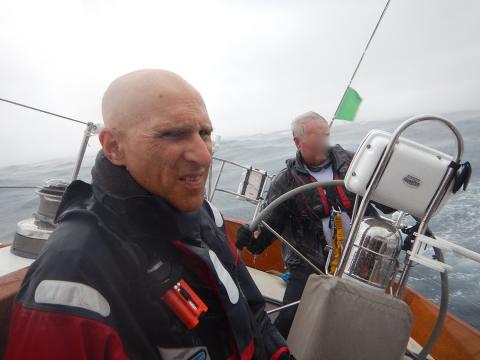Lifesavers
NINDS Investigator, Friends Honored for Rescue at Sea

Dr. Eric Wassermann, a staff clinician and chief of the behavioral neurology unit at NINDS, and his crewmates have recently been given a Lifesaving Award by the Humane Society of the Commonwealth of Massachusetts.
Wassermann was on Sparky, a friend’s 42-foot Hinckley sailboat, returning from the 2015 Marion, Mass., to Bermuda yacht race when the crew of 4 men and 1 woman overheard a distress call from Restive, another returning boat nearby.
Restive’s rudder had come loose, leaving it impossible to steer. More seriously, the loose rudderpost was breaking a hole in the hull and the boat was starting to take on water. Sparky’s skipper immediately changed course to intercept the damaged vessel. When Sparky reached the scene in 10- to 15-foot waves and winds gusting over 30 knots, Restive’s worried crew had exhausted their options for emergency steering and damage control and had decided to abandon ship.
The boats could not be brought near each other without the risk of serious damage and, 125 nautical miles from shore, they were out of air rescue range. The only choice seemed to be for Restive’s captain and crew of 4 to board their life raft and drift downwind to Sparky.
The decision to leave a floating boat for a life raft is never taken lightly, but deteriorating conditions, the approach of night and the unavailability of other help made the move imperative.
“The scariest part was the thought of losing someone in the transfer,” said Wassermann. “In all our 250 combined years of sailing, none of us had even considered how to recover people from an inflatable raft at sea. If someone went into the water in those conditions, there was no certainty we would get them back.”
As it happened, the transfer went smoothly, aside from a nasty cut on one Restive crewmember’s leg, which later became infected. Restive was found the next day, nearly full of water, by a salvage operation launched from Nantucket.
Last September, Sparky’s captain and crew were awarded the Robert N. Bavier Award for Seamanship or Sportsmanship by the Marion-Bermuda race authorities. Recently, however, the rescue came to the attention of the Humane Society of the Commonwealth of Massachusetts, which awarded the captain and crew its Lifesaving Award and are striking a special plaque for Sparky.
Founded in 1785, the society was formed to reduce loss of life in shipwrecks off the coast of New England. It also raised the initial capital to found the Massachusetts General, McLean and Boston Lying-In (now Brigham) hospitals.
